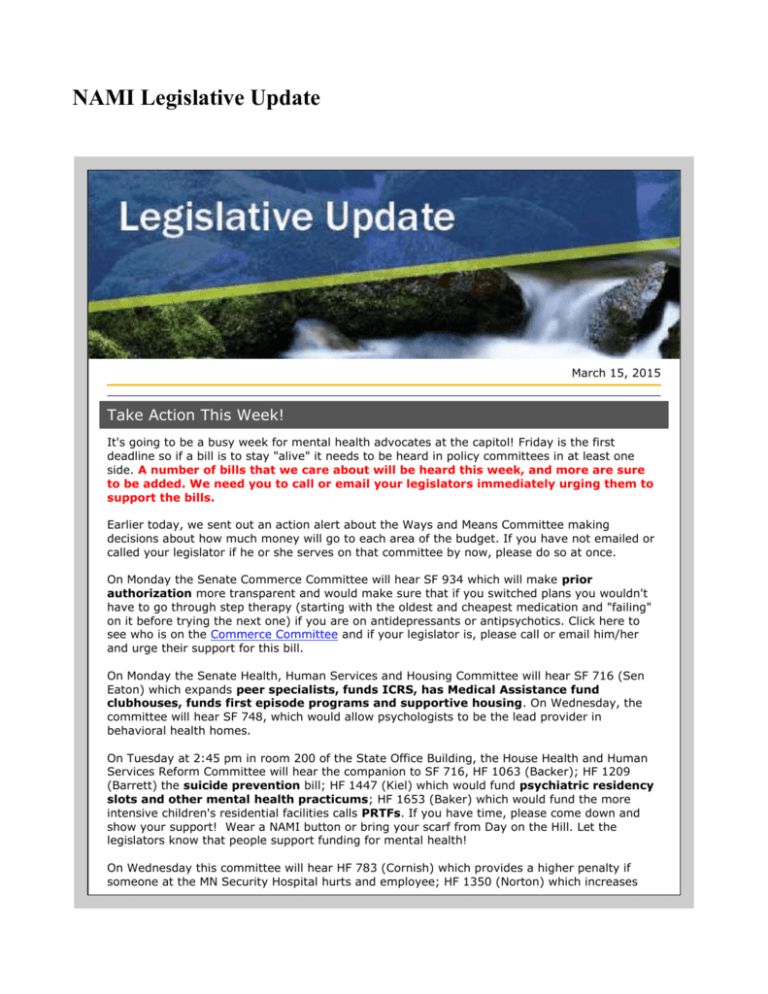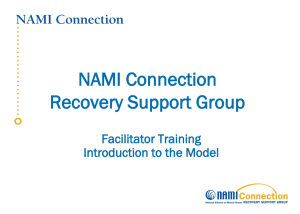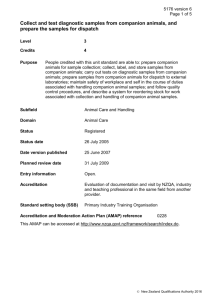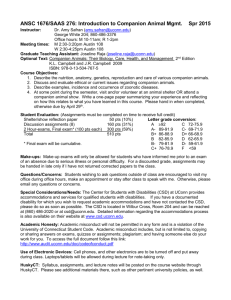here - NAMI Minnesota
advertisement

NAMI Legislative Update March 15, 2015 Take Action This Week! It's going to be a busy week for mental health advocates at the capitol! Friday is the first deadline so if a bill is to stay "alive" it needs to be heard in policy committees in at least one side. A number of bills that we care about will be heard this week, and more are sure to be added. We need you to call or email your legislators immediately urging them to support the bills. Earlier today, we sent out an action alert about the Ways and Means Committee making decisions about how much money will go to each area of the budget. If you have not emailed or called your legislator if he or she serves on that committee by now, please do so at once. On Monday the Senate Commerce Committee will hear SF 934 which will make prior authorization more transparent and would make sure that if you switched plans you wouldn't have to go through step therapy (starting with the oldest and cheapest medication and "failing" on it before trying the next one) if you are on antidepressants or antipsychotics. Click here to see who is on the Commerce Committee and if your legislator is, please call or email him/her and urge their support for this bill. On Monday the Senate Health, Human Services and Housing Committee will hear SF 716 (Sen Eaton) which expands peer specialists, funds ICRS, has Medical Assistance fund clubhouses, funds first episode programs and supportive housing. On Wednesday, the committee will hear SF 748, which would allow psychologists to be the lead provider in behavioral health homes. On Tuesday at 2:45 pm in room 200 of the State Office Building, the House Health and Human Services Reform Committee will hear the companion to SF 716, HF 1063 (Backer); HF 1209 (Barrett) the suicide prevention bill; HF 1447 (Kiel) which would fund psychiatric residency slots and other mental health practicums; HF 1653 (Baker) which would fund the more intensive children's residential facilities calls PRTFs. If you have time, please come down and show your support! Wear a NAMI button or bring your scarf from Day on the Hill. Let the legislators know that people support funding for mental health! On Wednesday this committee will hear HF 783 (Cornish) which provides a higher penalty if someone at the MN Security Hospital hurts and employee; HF 1350 (Norton) which increases funds for nonemergency medical transportation providers and funds protected transport; HF 1073 (Backer) which eliminates the word "constant" from the CFSS/PCA program and HF 1609 (McDonald) which would allow psychologists to be the lead provider in behavioral health homes. On Wednesday the Senate Health and Human Services Budget Division will hear SF 1152 (Eken) which funds the text message suicide program and SF 705 which increase Medical Assistance rates for mental health professionals. On Wednesday, the House Health and Human Services Finance Committee will hear HF 1439 (Loeffler) which increases Medical Assistance rates for mental health providers. Also on Wednesday the Senate Environment, Economic Development and Agriculture Budget Division will hear SF 456 which includes funding for the Bridges Housing program. If your legislator is on these committees, please take a minute to call in or email sending the message "Please support HF/SF - they are important to me as person who lives with a mental illness/is a family member/work in the field. Click to see who is on the Senate Health, Human Services and Housing Committee, Senate Health and Human Services Budget Division, House Health and Human Services Reform Committee, House Health and Human Services Finance Committee. Day on the Hill a Success! On Thursday, five hundred people came together in St Paul for Mental Health Day on the Hill. They came to urge legislators to support policies that will improve Minnesota's mental health system. Individuals living with mental illnesses, their families and friends as well as several high school students, mental health professionals and providers all turned out to push for increased funding for mental health treatment and services. People traveled from all corners of the state to attend including Winona, Rochester, Kerkoven, Willmar, Litchfield, Cokato, Fergus Falls, Moorhead, Detroit Lakes, Duluth, Cloquet, North Branch, Pine City, Wyoming, Baxter, Little Falls, St. Cloud and the metro area. Sue Abderholden, Executive Director of NAMI Minnesota, kicked it off by highlighting the strong tradition of Mental Health Legislative Network advocacy and noting its history of "30 years of bringing people together to raise their voices, 30 years of working to improve the mental health system." The theme of the day was "We know what works; Let's build on it!" Attendees were given scarves with that saying and every legislator received a mini-construction hat with that same saying. Sue explained that the construction hats are a symbol representing the need to build the mental health system. She said, "Our mental health systemisn't broken, it's never been built." Sue said, "We want to focus on what works today." She encouraged the crowd to ask their legislators to expand effective services. Shannah Mulvihill, the Executive Director of the Mental Health Association of Minnesota and the Mental Health Consumer/Survivor Network welcomed the crowd and thanked them for making the extra effort to make their voices heard. Bill Conley, with Fraser, provided information on how the budget is set and how important it is to make sure that health and human services gets a big enough piece of the "pie." Claire Wilson, Executive Director of the Minnesota Association for Community Mental Health Programs addressed the crowd saying "everybody should have access to the right level of care", she talked about the needs for greater rates, access and insurance coverage for crisis teams. Ben Ashley-Wurtman, Policy and Outreach Associate with the Mental Health Association provided information on adult mental health services, including adding clubhouses to Medical Assistance. Mary Regan, Executive Director of the Minnesota Council of Child Caring Agencies provided information about the many provisions affecting children and their families such as PRTFs, respite care and homeless youth. Dan Evans, Public Policy Director for NAMI provided information on funding proposals for housing and employment. Patricia Siebert provided information on efforts to decrease spenddowns and MA-EPD premiums. Sue Abderholden provided some information about the suicide bills. Jode Freyholtz-London, Executive Director of Wellness in the Woods, spoke in strong support for 24/7 mental health crisis services. She told the crowd "we don't get to choose when our crises happen; we need mobile crisis teams across Minnesota." She explained how crisis teams are the only appropriate response for people experiencing a mental health crisis. Representative Tina Liebling told the crowd "we cannot afford to leave anyone behind." She continued "we need services that are accessible, are appropriate, and as close to home as possible." She finished by saying "what happens to any of us, really does happen to all of us." Kim Lutes with the Mental Health Association spoke to the importance of employment and bringing down MA-EPD premiums. Matt Burdick, Legislative and Stakeholder Relations for Chemical and Mental Health Services at the Department of Human Services, provided a brief overview of what is in the Governor's budget. Larry Jones spoke about the importance of clubhouses and Melissa Balitz spoke to the need to be able to access services when someone needs them. Sue ended the rally urging the crowd to "finish the job" of building the mental health system. She concluded with "we know what works, let's build on it." Thanks to everyone who came out and made the day a great success. Your efforts and your advocacy make a huge difference! Please check out all the great tweets from legislative visits during 2015 Mental Health Day on the Hill. Press Conference Held A press conference was held on Tuesday to express support for building on the foundation of Minnesota's mental health system. Sue Abderholden, executive director of NAMI Minnesota, remarked, "Many say that we have a broken system of mental health care. Frankly, our mental health system was never built. We have spent the past ten years building the foundation for home and community-based services and supports, crisis services, and intensive services. We now know what works. We need to complete what we started and finish building our mental health system." Rep. Matt Dean (R) stated, "I want to say thanks to the advocates for really pushing mental health as a priority for 2015 this session. I also want to say thanks to the Governor's office and the Governor for really prioritizing mental health. The area of mental health is one of those areas that we can come together around and agree that we want to work on. We're excited about the bills ahead." Sen. Tony Lourey (D) commented, "For mental health we really do know what works. We've done a lot of pilots and projects. We know what works. We haven't invested in making sure that what works is available around the state and that's what this package that we're bringing forward is going to focus on, is building a network, an infrastructure to make that available statewide." "The initiatives this year that we are working on and supporting really fit into the category of filling in gaps in services with investments that we know work and will create better outcomes, " said Sen. Kathy Sheran (D). Over 30 bills have been introduced this year between the house and the senate that would improve access to effective services, expand our mental health workforce, provide support to families of children with mental illnesses, provide housing and employment supports, expand access to home and community based supports, expand access to crisis services, earlier intervention and intensive services and increase our efforts to prevent suicide. Addressing the mental health workforce shortage, MayKao Y. Hang, President and CEO of the Wilder Foundation remarked, "We need to build a highly competent, culturally representative workforce that understands low-income populations, populations of color, immigrant populations and kids." Rep. Bob Barrett (R), author of a bill on suicide prevention this session, said, "This year I want the legislature to take action to decrease the numbers of suicides. This includes expanding our suicide prevention programs to teach teachers, firefighters, peace officers, primary care providers, coaches and others about the warning signs of suicide and actions they can take to recognize mental illness when it happens." Lawrence Massa, president and CEO of the Minnesota Hospital Association which represents 143 health systems & hospitals throughout the state, remarked, "I think the good news today is that the stigma long associated with discussing mental health is slowly and surely going away. And we applaud Gov. Dayton, NAMI and the Mental Health Legislative Network for making it ok to talk about, and acknowledge and treat mental health." Also speaking at the press conference were DHS Commissioner Lucinda Jesson, Rep. Dave Baker (R), Sen. Chris Eaton (D), Kim Lutes from the Mental Health Association of Minnesota, and Wendy Waddell, Director of Inpatient Mental Health Care at Regions Hospital. Letters of support for funding mental health, especially crisis teams, came from the MN Hospital Association, MN Medical Association, MN Psychological Association, MN Society of Clinical Social Workers, Northeast Metro District 916, Mental Health Crisis Alliance, Wellness in the Woods, American Academy of Pediatrics, Home for All, MN Association of Community Mental Health Programs, NASW, Ramsey County, MN Association of County Social Service Administrators, Vail Place, Resource, Hennepin County, Mental Health Association of MN, MN Council of Child Caring Agencies, Read the MinnPost article or this opinion piece by Lori Sturdevant. Committee Hearings Senate Health and Human Services Budget Division Committee On Tuesday, the Health and Human Services Budget Division heard SF 63 (Eken) which would allow Medical Assistance coverage for primary care consultations with licensed independent clinical social workers and licensed marriage and family therapists. Senator Eken talked about the "skill and training" these professionals can offer to primary care to improve access to mental health care. Bill Strusinski, lobbyist for the MN Society for Clinical Social Work testified in support for the bill. Amanda Richards, a Licensed Professional Clinical Counselor (LPCC), representing the Minnesota Counseling Association, asked to have LPCCs added to the bill since they are mental health professionals as well. Senator Eken responded that he wasn't opposed to including LPCC's but first there needed to be a fiscal note. The bill was laid over for possible inclusion in the omnibus bill. The committee met on Tuesday to hear SF 3 (Clausen), which expands the loan forgiveness program to mental health professionals. Sue Abderholden testified to the bill stating how important it is to expand our workforce in order to expand access to mental health services. David Lee, executive director of Woodland Centers and representing the MN Association of Community Mental Health Programs, also testified in favor of the bill pointing to the need for more mental health professionals in rural Minnesota. The bill was laid over for possible inclusion in the omnibus bill. Senate Health, Human Services and Housing Committee The committee heard SF 1426 (Clausen) which would provide residency slots for primary care and psychiatry and would fund clinical training programs for health care and mental health care training programs. Dr. George Realmuto, professor of psychiatry at the U of M spoke in favor of the bill noting that we have barely half or the psychiatrists that are needed in Minnesota and that the state needs to step in to address this. The bill passed and was rereferred to the Senate Health and Human Services Finance Committee. The committee then heard SF 702 (Sheran) which would require people who are committed as "mentally ill and dangerous" to be reviewed by the special review board every three years and would require the review board to summarize the barriers to people 's recovery. Sue Abderholden testified for the bill, providing information about the task force that created these recommendations. The bill passed and was rereferred to Judiciary. Later on Monday night, the committee heard SF 717 (Eaton) which funds mobile crisis teams and crisis beds, along with requiring private insurance to cover services. It was the last bill on the agenda, and the hour was late. Sue Abderholden with NAMI said she understood that people were tired and wanted to go home but the bill before them was probably one of the most important ones affecting people with mental illnesses and their families this year. She went on to provide information about the effectiveness of crisis teams and beds. She provided information about Hennepin's team where in 2014 they answered over 16,000 calls from over 5,000 people. Hospitalization was prevented in 70% of the interventions with adults and 91% with children. Claire Wilson, with the MN Association of Community Mental Health Programs, also testified in favor of the bill. Senator Eaton provided final comments stating that the use of crisis teams prevents not only hospitalizations but also being jailed. The bill passed and was rereferred to the Commerce Committee. On Wednesday night, the committee heard SF 934 (Franzen) brought forward by the MN Medical Association. The bill would make health plans formularies and prior authorization policies more transparent, not allow plans to make formulary changes during a year, and require a plan to continue covering a person's antipsychotic or antidepressant for a new enrollee and not make the person go through step therapy. Dr. George Schoephoerster spoke at length about the problems with prior authorization and the impact on patients. Kellie Carlson shared her personal story of living with arthritis and not being able to obtain her medications and the higher costs personally and financially because of that. Sue Abderholden testified in favor of the bill pointing out how difficult it can be to find the right medications and how devastating it can be to have to switch medications simply because your changed plans. There were several people testifying against the bill, mainly people from benefit management companies and health plans. The committee passed the bill and rereferred it to the Commerce Committee. The committee also heard SF 1292 (Sheran) that increases rates for nonemergency medical transportation providers and fund protected transport. Sue Abderholden testified as the chair of the NEMT task force. The bill passed and was rereferred to the Transportation Committee. Senate Education Committee On Monday morning, the Senate Education Committee heard SF 1002 (Hoffman) that requires paraprofessionals to have specific training to serve the unique and individual needs of each of these students. Alex, a student, spoke in support of the bill. He talked about his experiences as a student where some paraprofessionals were very patient with him and greatly supported his progress. He said there were also many others that did not understand the unique challenges he faced and were difficult to work with. Alex mentioned that this was the 25th Anniversary of the American Disabilities Act, and asked that the committee support SF 1002 to help students with disabilities succeed. Grace Kelleher of the Minnesota School Boards Association expressed concerns that the bill may make the training standards too high for educational paraprofessionals. The bill was laid over for possible inclusion in the omnibus bill. The committee also heard SF 740 (Pratt). The bill requires school districts to contract only with vendors that use a universal filing system for online case management systems for IEPs and eliminates the requirement that districts use the system that the Minnesota Department of Education is developing. After extended testimony there was significant difference of opinion over SF 740, it was rereferred to Judiciary without a recommendation. The Senate committee heard SF 1001 (Hoffman) which would make it more difficult for schools to suspend students. Many special education students are suspended, especially those children in EBD classrooms. In in the 2013-2014 school year, over 43,000 students were suspended or expelled (a child could be counted twice in this data). Nearly 9,000 were in grades K-5. Barb Ziemke from Pacer testified first about the main points of the bill. NAMI Minnesota's executive director, Sue Abderholden, testified for the bill stating that for young students to have done something so egregious that they were suspended it was critically important to look at the underlying causes. A child could have been exposed to trauma or have the early symptoms of a mental illness. The symptoms can come out as aggression, lack of self-control, opposition to parents or teachers, lack of remorse, etc. Suspending a child that young does not teach them anything. We need instead to look at alternatives such as social emotional learning, mental health treatment, etc. Darren Kermes, a special ed director also spoke in favor of the bill. The bill passed out of the committee with the promise to work with the organizations that had concerns with the bill, including the MN School Board Association and MN Principals. A meeting has occurred and NAMI feels that there will be an agreement early next week. Senate Environment, Economic Development, and Agriculture Budget Division The committee heard SF 1006 (Tomassoni) which increases funding for the IPS employment program. Three people testified for the bill. Sue Abderholden testified about the benefits of this evidence-based employment program. Two people who have been assisted by IPS, Jamie and Patricia, provided eloquent and impactful testimony about how work helped in their recovery, the importance of employment to their self-esteem and financial stability, and how they loved their jobs. Natasha Olson from RISE provided additional information about how the IPS program works. The bill passed and was laid over for possible inclusion in the omnibus bill. Senate Judiciary On Tuesday, the Senate Judiciary committee heard SF 1078. This bill would allow the county social workers to share data with health care social workers provided they had patient consent. The bill was amended during the meeting to make the need for patient consent for information sharing clearer in the language. The bill is intended to help the county do a better job connecting people with services when they are homeless, highly mobile, or in and out of inpatient health care settings. Senator Champion and Hennepin County Commissioner Marion Greene spoke in favor of the bill. Senator Champion emphasized that the bill would allow for better care coordination. The bill was passed and referred to the Senate Committee on Health and Human Services. On Thursday, SF 994 (Latz) on juvenile justice provisions was discussed. The bill provides 1) grants to establish alternatives to juvenile detention programs; 2) specifies that when youth are tried as adults, the court does not need to observe mandatory minimum sentences; 3) Gives police officers the ability to send youth who had committed non-violent offenses to diversion programs instead of juvenile detention; and 4) Would prevent the use of restraints on a youth appearing in court, unless the youth has a history of disruptive or recent violent behavior. The first provision was deleted since it would cost money. Senator Hall was concerned that the proposed restriction on the use of restraints may cause problems for the court if a child was "out of control." Jim Franklin, Executive Director of the Minnesota Sheriff's Association, shared concerns that the new language may not provide enough protection for the people in court, including the youth. In response to these concerns two oral amendments were adopted. The first amendment expands the courts basis for putting a youth in restraints to when there was "disruptive behavior" while being in police custody for any previous offense. An additional amendment from Senator Hall was adopted allowing the court to be provided with a child's "behavioral history" to inform their consideration of the use of restraints. The bill was recommended to pass and will go to the Senate floor. Later in the afternoon the Judiciary committee heard SF 1356 (Sheran), the Department of Human Services Policy bill. Several amendments were discussed including one that clarified the tracking of trips under nonemergency medical transportation and the other amendment added coaching and counseling to the list of covered PCA services. The bill was recommended to pass and referred to the full senate. On Friday morning, the Senate Judiciary committee discussed SF 498. This bill would regulate the use of body cameras by the police. This bill touches on many important privacy, law enforcement, and technical issues. The two hour meeting offered many parties the opportunity to respond to the bill. NAMI's interest in the bill is that we are concerned that any video of police handling a mental health crisis could be made public to anyone, not just the involved person or his/her attorney. Several amendments were offered but not passed. Senator Latz will have an additional hearing on SF 498 next week in Senate Judiciary. The committee heard SF 702, which would require an automatic review by the special review board at least every three years for people committed as mentally ill and dangerous. In addition, the special review board would track the barriers that people are facing to their recovery. The bill passed and was rereferred to the Finance Committee. Senate Transportation Committee SF 1292 (Sheran), the bill funding Nonemergency medical transportation (NEMT) and protected transport, was heard in the senate transportation committee on Friday. Sue Abderholden spoke in favor of the bill. The senate bill passed and was sent to finance. House Transportation Committee HF 1350 (Norton), regarding NEMT was heard in the House Transportation and Policy Committee. Sue Abderholden testified for the bill. The house bill was sent to Health and Human Services Reform Committee. House Public Safety and Crime Prevention Policy Committee On Tuesday, the House Committee on Public Safety and Crime Prevention Policy met. The committee heard HF 1180 (O'Neill) that funds the expansion of specialty courts. William Leary III, a Ramsey County District Court Judge, testified in favor of the bill. Judge Leary works with the Ramsey County Mental Health Court and has seen its effectiveness. He said that these specialty courts help to reduce "the level of crime, the cost to our judicial system (as well as our public safety system) and also, as a byproduct, help people get on with their lives in a productive way." Rep. O'Neill also spoke to the effectiveness of the specialty courts, citing reductions in repeat offenses and jail time for those who have been through the problem solving courts in Ramsey County. Kim Bingham, the Assistant Ramsey County Attorney, also testified in support of the bill. She highlighted national drug court research showing that, for every one dollar invested by taxpayers in drug courts, we save $3.36. She suggested that money is needed "to identify the appropriate high risk, high need clients" that would benefit from evidence-based specialty court services. HF 1180 was laid over for potential inclusion in the omnibus bill. House Education Committee The committee met on Thursday night and heard HF 964 (Wills). Rep. Wills offered an amendment that deleted the three sections that were of concern to NAMI and other special education advocates. The sections that were deleted would have required an independent analysis of where state law exceeds federal and would have allowed districts to not follow state law if it exceeded federal. One area where MN law exceeds federal is our early intervention law where services begin as soon as a child is identified as having a disability and all the requirements governing the use of seclusion and restraints. Sue Abderholden briefly testified, thanking Rep Wills addressing our concerns. House Health and Human Services Finance Committee This committee heard the Home4all bill, which includes funds for long-term homelessness and supportive housing for people with mental illnesses. Sue Abderholden testified for the bill on behalf of NAMI and HearthConnection, providing information about how the funding is used. The bill was laid over for possible inclusion in the omnibus bill. House Health and Human Services Reform On Wednesday the committee heard HF 1088 (ONeill) that creates patient care zones and increases crimes related to drugs and violence when these act are committed in them. There was quite a bit of discussion with some members wondering how to prevent rather than to just respond to violence and other worried that we would be criminalizing symptoms related to dementia or mental illnesses. Representative Loeffler stated that the bar for not guilty by reason of insanity is very high in our state and she expressed concern that people in our care facilities should not have to be concerned with being thrown in jail. The bill was passed and referred to House Public Safety & Prevention. On Friday the committee heard HF 1246 (Mack) which would expand coverage for telemedicine and it heard HF 604 (Baker) which would increase funding for chemical dependency providers. Rep Baker shared his family's story - his son overdosed and died - and said, "no one wakes up wanting to be an addict." He provided powerful testimony for support of his own bill. Heidi Kammer from Resource provided excellent testimony as well. The bill passed and was rereferred to Finance. It also heard HF 1011 (Albright) which would allow physician assistants (PA) to bill Medical Assistance for medication management and evaluation and management services for people with mental illnesses in outpatient settings under Medical Assistance. They would be supervised by a psychiatrist and could not performing psychotherapy or diagnostic assessments or providing clinical supervision. NAMI and the Mental Health Legislative Network have long opposed this bill, arguing that people on MA tend to have the most serious mental illnesses and PAs have very little training on mental health. There was a task force that met on this very issue and a compromise could not be reached. The PAs argued that they were generalists and shouldn't have to specialize; we argued that mental health is a specialty area and they need additional training. Trisha Stark from the MN Psychological Association testified against the bill along with Sue Abderholden. This year's bill does require 2000 hours of clinical experience (for comparison other mental health professionals have to have 4000 hours) and it was amended to say that they had to be in mental health. NAMI was willing to accept the 2000 hours of experience if there were also coursework (12 credits) or 50 CME credits and were willing add PAs who had completed the program at Regions plus coursework (6 credits) or 25 CMEs. This was rejected by the PA organization despite the fact that the very idea came from a PA who had completed the program at Regions. The bill passed the committee and was sent to the full house. NAMI Bills Introduced More bills were introduced this week to carry forward our goals of increasing access to the mental health system. If your legislator is a chief author - call and thank them. If he or she signed on as a co-author, please email them and thank them as well. When legislators support our issues we need to take the time to thank them! The bills are listed below. HF 1568 (Hoppe) (Companion to SF 702) Referred to the Committee on Health and Human Services Reform. Requires the special review board to schedule hearings at least every three years for anyone committed as "mentally ill and dangerous." It also requires the special review board to identify any barriers or obstacles that may be preventing the person from progressing in treatment and to report to the commissioner of human services on any trends that they may be seeing. HF 1611 (Backer) Referred to the Committee on Health and Human Services Reform. This bill takes key items from the Governor's bill. Authorizes the Excellence In Mental Health Demonstration Project, includes clarifying language for assertive community treatment teams, directs the commissioner of human services to analyze and identify alternate payment structures for community-based mental health services and appropriates money for respite care programs, a psychiatric residency at DHS, and early childhood mental health. HF 1653 (Baker; Miller and Dean, M.) (Companion to SF 1588) Referred to the Committee on Health and Human Services Reform. Authorizes the department of human services to seek Medical Assistance coverage for psychiatric residential treatment facilities for those younger than 21. Specifies enrolling up to 150 beds at up to six sites. This language was in the Governor's bill. SF 1588 (Koenen and Clausen) (Companion to HF 1653) Referred to the Committee on Health, Human Services and Housing. Authorizes the department of human services to seek Medical Assistance coverage for psychiatric residential treatment facilities for those younger than 21. Specifies enrolling up to 150 beds at up to six sites. This language was in the Governor's bill. Additional legislators signed on as co-authors to NAMI bills. They include Rep. Loeffler to HF 1062(crisis teams); Rep. Hornstein to HF 581(Homeless Youth Act); Rep. Bly, Erhardt, Hausman, Wagenius, Lenczewski, and Kahn; Rep. Sundin to HF 120(Suicide Prevention); Rep. Moran to HF 1233 (Student Discipline); Rep. Theis to HF 803(Loan Forgiveness); Rep. Moran to HF 1441 (Rates Increase); Senator Saxhaug to SF 633(Rates Increase); Rep. Ward to HF 604(Rates Increase). Medicare Bill Introduced, More Sponsors Needed Senators Charles Grassley, R-Iowa, and Sherrod Brown, D-Ohio, introduced the bipartisan Medicare Formulary Improvement Act (S. 648) last week to protect mental health medications in Medicare Part D. These medications are crucial in the treatment of illnesses like schizophrenia, depression, and bipolar disorder. Currently these medications are in a "protected class" ensuring that when a doctor prescribes them they will not be subject to a denial based on things like cost. So why do we need this bill?You may remember last year that there was an attack on the "protected class" designation by the Federal Centers for Medicare and Medicaid Services (CMS). In order to make sure that these life-saving medications remain in a "protected class" free from repeal you must raise your voice in support of this bill. Contact your Senators TODAY asking them to co-sponsor this critical legislation. Senators Email Your Not sure who represents you? Bill Summaries House HF 1535 (Mack) (Companion to SF 1356) Referred to the Committee on Health and Human Services Reform. This is the DHS policy bill. HF 1559 (Gruenhagen and Drazkowski) (Companion to SF 1677) Referred to the Committee on Health and Human Services Reform. Amends the mandatory interoperable electronic health record expansion law to make it optional for providers. HF 1560 (Gruenhagen and Drazkowski) (Companion to SF 1713) Referred to the Committee on Health and Human Services Reform. In documenting patient consent for release of records, requires that consent forms must include options to agree or disagree with each individual item for which a provider requests consent. Requires the form to allow patients to initial next to each item. HF 1568 (Hoppe) (Companion to SF 702) Referred to the Committee on Health and Human Services Reform. Requires the special review board to schedule hearings at least every three years for anyone committed as "mentally ill and dangerous." It also requires the special review board to identify any barriers or obstacles that may be preventing the person from progressing in treatment and to report to the commissioner of human services on any trends that they may be seeing. This is a NAMI bill. HF 1574 (Quam; Lohmer; Drazkowski; Gruenhagen and Newberger) Referred to the Committee on Health and Human Services Reform. In order for a staff person at a residential program to make food purchases with a resident's EBT card, requires the staff person to be listed as that person's authorized representative. Also requires residential programs to document all purchases made by program staff using residents' EBT cards. HF 1588 (Dean, M.) (Companion to SF 1717) Referred to the Committee on Compliance and Regulatory Reform. Requires health insurance companies to make information describing health plans offered and eligibility requirements publically available on their website. Also requires companies to report information regarding all plans, cost-sharing requirements, a summary of benefits and coverage, and other detailed information to the commissioner of human services. HF 1591 (Erickson) (Companion to SF 1495) Referred to the Committee on Education Innovation Policy. This is the education policy bill. HF 1609 (McDonald) (Companion to SF 748) Referred to the Committee on Health and Human Services Reform. Allows a licensed psychologist to serve as the lead health care provider, care coordinator, mental health care manager, or designated provider for a behavioral health home. HF 1611 (Backer) Referred to the Committee on Health and Human Services Reform. This bill takes key items from the Governor's bill. Authorizes the Excellence In Mental Health Demonstration Project, includes clarifying language for assertive community treatment teams, directs the commissioner of human services to analyze and identify alternate payment structures for community-based mental health services and appropriates money for respite care programs, a psychiatric residency at DHS, and early childhood mental health. This is a NAMI bill. 1620 (Fischer; Allen; Liebling; Clark; Murphy, E. et al.) (Companion to SF 1213) Referred to the Committee on Health and Human Services Reform. The "Protection from Conversion Therapy Act" prohibits mental health practitioners or mental health professionals from using in conversion therapy with clients under 18 years of age or with vulnerable adults. Conversion therapy is defined as any practice intended to change an individual's sexual orientation or intended to discourage a transition from one gender to another. NAMI supports this bill. HF 1630 (Zerwas; Schoen; Dean, M.; Franson; Schultz; Hamilton and Albright) (Companion to SF 1592) Referred to the Committee on Commerce and Regulatory Reform. If inpatient mental health and substance abuse services are to be covered by a health maintenance organization and a utilization review determines that a service should not be certified, if that decision was made by a certified psychiatrist, then a peer of the treating mental health provider must review the request. HF 1640 (Companion to SF 1493) (Peterson; Murphy, E.; Zerwas; Fenton; Christensen; Nornes; Metsa; Considine; Fischer; Selcer; Erhardt; Halverson; Masin and Norton) Referred to the Committee on health and Human Services Reform. Repeals the parental fee under TEFRA and replaces it with a requirement that parents demonstrate their child has health insurance. HF 1653 (Baker; Miller and Dean, M.) (Companion to SF 1588) Referred to the Committee on Health and Human Services Reform. Authorizes the department of human services to seek Medical Assistance coverage for psychiatric residential treatment facilities for those younger than 21. Specifies enrolling up to 150 beds at up to six sites. This language was in the Governor's bill. This is a NAMI bill. HF 1662 (Loeffler; Zerwas; Lohmer; Murphy, M.; Liebling; Moran; Lillie; Quam; Hamilton; Halverson; Fischer) (Companion to 1734) Referred to the Committee on Health and Human Services Reform. Increases income limits for medical assistance eligibility. HF 1677 (Albright) (Companion to SF 1553) Referred to the Committee on Transportation Policy and Finance. Specifying that anyone the Commissioner of Human Services may contract with the Indian Health Service of the United State Department of Health and Human Services for the care and treatment of people committed by a tribal court order for the care and treatment of mental illnesses, developmental disability or chemical dependency. The contract shall provide that the Indian Health Service and any federally recognized Indian tribe within the state shall not transfer any person for admission to a regional center unless the commitment procedure utilized by the tribal court provided specific due process protections. HF 1712 (Quam and Barrett) (Companion to SF 1728) Referred to the Committee on Education Innovation Policy. Authorizes the commissioner of education to help coordinate school crisis response teams. Response teams include school administrators, guidance counselors, psychologists, social workers, teachers, nurses, security experts, media relations professionals, and other related areas. HF 1767 (Allen) (Companion to SF 1634) Referred to the Committee on Aging and Long-Term Care Policy. Provides funding for nontraditional counseling services including supportive services and counseling related to depression, suicide, anxiety, school failure, and chemical abuse. It also funds a walk-in counseling center for adults and youth whose social and emotional problems, frequently evolving from experiences of abuse, childhood trauma, and inadequate family and social support, are serious obstacles in their lives. The counseling is free and anonymous. Senate SF 1484 (Clausen; Carlson; Senjem and Hoffman) (Companion to HF 1228) Referred to the Committee on Health, Human Services and Housing. Directs DHS to request from the Center for Medicare and Medicaid Services waivers necessary to create a residential campus program to serve individuals with autism spectrum disorder. Requires the program to provide continuous onsite supervision, sensory or therapeutic programming appropriate for each resident, and to incorporate independent living skills. Appropriates $250,000 in FY 2016 for multiple programs and initiatives targeted at Minnesotans with autism spectrum disorder. SF 1485 (Clausen; Carlson; Senjem and Hoffman) (Companion to HF 1351) Referred to the Committee on Health, Human Services and Housing. Directs the commissioner of human services to coordinate with counties to identify a maximum of nine foster care licenses to serve children and young adults with autism spectrum disorder. Includes young adults up to age 25, and will be targeted at counties with the greatest population density and need. Eligible children must be approved for out-of-home placement and be either in an out-of-home placement already or currently waiting for placement. SF 1493 (Hayden; Hoffman; Marty; Eken and Senjem) (Companion to HF 1640) Referred to the Committee on Health, Human Services and Housing. Repeals the parental fee under TEFRA and replaces it with a requirement that parents demonstrate their child has health insurance. SF 1495 (Wiger) (Companion to HF 1591) Referred to the Committee on Education. This is the education policy bill. SF 1505 (Dahle) (Companion to HF 964) Referred to the Committee on Education. Direct the Commissioner of Education to solicit a request for proposal to conduct an economic and educational analysis of conforming the state's special education programs to conform to federal minimum requirements. Directs the Department to provide teachers working with students with disabilities resources about how to comply with federal requirements. Also directs the commissioner to examine special education rules and make changes so that they conform to upto-date statutes. SF 1530 (Hoffman; Metzen; Lourey and Sheran) (Companion to HF 1587) Referred to the Committee on Commerce. Limits health plans and pharmacy benefit managers from restricting enrollee's choice of pharmacy or pharmacist. As long as the pharmacy or pharmacist is licensed by the state and agrees to the terms of the health plan's contract, an enrollee must be able to use that pharmacy without any restriction or added cost-sharing requirement. SF 1570 (Eaton, Hoffman, Goodwin) Referred to the Committee on Finance. Supports up to four physicians at the Hennepin County Medical Center enrolled in an addiction medicine fellowship program. The program will (1) to train fellows in: (i) diagnostic interviewing; (ii) motivational interviewing; (iii) addiction counseling; (iv) recognition and care of common acute withdrawal syndromes and complications; (v) pharmacotherapies of addictive disorders; (vi) epidemiology and pathophysiology of addiction; (vii) identification and treatment of addictive disorders in special populations; (viii) secondary interventions; (ix) the use of screening and diagnostic instruments; (x) inpatient care; and (xi) working within a multidisciplinary team; and (2) to prepare fellows to practice addiction medicine in rural and underserved areas SF 1588 (Koenen and Clausen) (Companion to HF 1653) Referred to the Committee on Health, Human Services and Housing. Authorizes the department of human services to seek Medical Assistance coverage for psychiatric residential treatment facilities for those younger than 21. Specifies enrolling up to 150 beds at up to six sites. This language was in the Governor's bill. This is a NAMI bill. SF 1590 (Dibble) (Companion to HF 715) Referred to the Committee on Finance. Allows the commissioner of public safety to award a grant to a nonprofit that addresses disparities in the juvenile justice system to accomplish cost-effective interventions that leverage the strength of families and communities with grants of $2,500,000 in FY 2016 and $2,500,000 in FY 2017. SF 1591 (Hoffman; Rosen and Eken) Referred to the Committee on Finance. Increases Medical Assistance reimbursement rates by 23.7% for critical access services provided on or after 12/31/15 by licensed independent clinical social workers, family therapists, psychologists and licensed professional clinical counselors. SF 1592 (Senators Clausen; Hoffman; Eaton; Hayden and Nelson) (Companion to HF 1630) Referred to the Committee on Health, Human Services and Housing. Requires a child or adolescent psychiatrist to review a denial for mental health or substance use disorder treatment for children for utilization reviews. Expands the review requirements to inpatient. SF 1598 (Franzen) (Companion to HF 1848) Referred to Transportation and Public Safety. Provides rules governing volunteer-based nonprofit providers of special transportation services. Organizations providing these services must receive an annual certificate of compliance, undertake annual vehicle safety inspections, receive no compensation exceeding the charitable standard mileage rate, and meet other requirements. SF 1606 (Senators Benson; Lourey; Rosen and Bonoff) Referred to the Committee on Health, Human Services and Housing. Requires DHS to establish a grant program to create jobs for people who have experienced long-term unemployment and are heavily reliant on government services. This program is intended to serve veterans, recently incarcerated individuals and people living with mental illnesses and chemical addiction. Grants will be provided the private employment sector based on their ability to develop a clear plan to create full/part time positions and integrate employment services with health, housing and other critical services. SF 1634 (Senators Dibble; Cohen; Franzen; Hayden and Latz) (Companion to HF 1767) Referred to the Committee on Health, Human Services and Housing. Provides funding for nontraditional counseling services including supportive services and counseling related to depression, suicide, anxiety, school failure, and chemical abuse. It also funds a walk-in counseling center for adults and youth whose social and emotional problems, frequently evolving from experiences of abuse, childhood trauma, and inadequate family and social support, are serious obstacles in their lives. The counseling is free and anonymous. SF 1677 (Limmer; Benson; Chamberlain; and Brown) (Companion to HF 1559) Referred to the Committee on Health, Human Services and Housing. Amends the mandatory interoperable electronic health record expansion law to make it optional for providers. SF 1691 (Senators Hawj; Hayden; Hoffman; Lourey and Rosen) Referred to the Committee on Finance. Appropriates $100,000 in fiscal year 2016 for DHS to give grants to nonprofits to provide culturally specific mental health services to military veterans of Southeast Asian descent born before 1965. SF 1708 (Sheran) Referred to the Committee on Health, Human Services and Housing. This bill changes language for the Community First Services and Supports (CFSS) program. It clarifies that consultation services will provide assistance to participants to make informed choices about CFSS services. It also adds a section on the person-centered planning process, which will allow the participant, to the maximum extent possible, to direct their own care. It clarifies the qualification criterion for CFSS service authorization levels. Requires the agency-provider to undertake quarterly evaluations of CFSS services and defines the criteria for the evaluations. Also requires and describes a complaint process to be developed by all CFSS agency-providers for program participants. It also identifies program participant rights and protections. SF 1710 (Kiffmeyer) (Companion to HF 1287) Referred to the Committee on Health, Human Services and Housing. Requires and commissions a report on treatment of pediatric attention deficit hyperactivity disorder by requiring the department to analyze data on the diagnosis and treatment from physicians and mental health professionals. The report includes a health equity impact assessment. SF 1713 (Benson; Limmer and Hall) (Companion to HF 1560) Referred to the Committee on Health, Human Services and Housing. In documenting patient consent for release of records, requires that consent forms must include options to agree or disagree with each individual item for which a provider requests consent. Requires the form to allow patients to initial next to each item. SF 1717 (Rosen and Dahms) (Companion to HF 1588) Referred to the Committee on Commerce.Requires health insurance companies to make information describing health plans offered and eligibility requirements publically available on their website. Also requires companies to report information regarding all plans, cost-sharing requirements, a summary of benefits and coverage, and other detailed information to the commissioner of human services.








